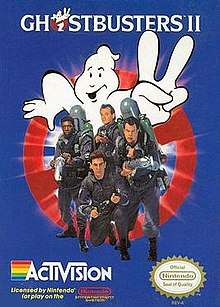Ghostbusters II (NES video game)
| Ghostbusters II | |
|---|---|
 North American box art | |
| Developer(s) | Imagineering |
| Publisher(s) | Activision |
| Director(s) | Dan Kitchen |
| Producer(s) | Tom Sloper |
| Designer(s) |
Dan Kitchen Additional design: Rob Harris Tony Chung Lau Alex DeMeo |
| Programmer(s) |
Dan Kitchen Rob Harris Tony Chung Lau Alex DeMeo |
| Artist(s) |
Mike Sullivan (also art director) Jesse Kapili |
| Composer(s) | Mark Van Hecke |
| Platform(s) | NES |
| Release | |
| Genre(s) | Platformer |
| Mode(s) | Single-player |
Ghostbusters II is a 1990 video game for the NES, developed by Imagineering and published by Activision, based on the film Ghostbusters II. Synthesized versions of songs from the film are featured in the game: the main theme and "Higher and Higher".
In Europe and Japan, HAL Laboratory released its own Ghostbusters II game called New Ghostbusters II.
Gameplay
Activision's game is a single-player side-scrolling game. Generally, the player controls a ghostbuster as he explores levels based on the film. The character's goal is to make his way to the museum before time runs out. Two levels involve riding around in the heroes' famous car. In another level the player controls the Statue of Liberty, shooting fireballs. The ghostbuster character is armed with unlimited supplies of slime that can be shot out of a cannon and ghost traps.
The game is noted for being exceptionally hard to complete for several reasons. The time limit and a complete lack of health bar for the character put constraints on survival. In addition, in some levels, the display scrolls to the left, which forces the player to make quick decisions. In addition, the player must successively complete the final level four times to reach the game's conclusion. The game also lacks a standard pause feature, contributing to the game's overall challenge.
Reception
Computer and Video Games gave the game a 61 percent rating and wrote that it "has awful graphics, average sound and isn't exactly a steal at the price. Avoid."[1]
References
- ↑ "Ghostbusters 2". Computer and Video Games. March 1991. p. 74. Retrieved August 14, 2016.